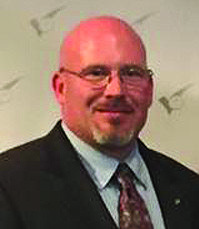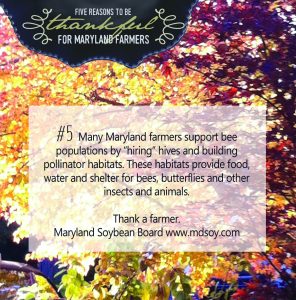William Layton Appointed to United Soybean Board
 (VIENNA, MARYLAND) – Working for Toyota for eight years before coming home to farm has given William Layton a unique view on the need for volunteer leadership in the Ag Community. “A company like Toyota has a legal dept, a lobbying division, a research and development department, a HR department, and a marketing department. Farmers have none of these. That’s why I believe so strongly in volunteering with agriculture organizations like the United Soybean Board that help to fill those roles for farmers,” William says.
(VIENNA, MARYLAND) – Working for Toyota for eight years before coming home to farm has given William Layton a unique view on the need for volunteer leadership in the Ag Community. “A company like Toyota has a legal dept, a lobbying division, a research and development department, a HR department, and a marketing department. Farmers have none of these. That’s why I believe so strongly in volunteering with agriculture organizations like the United Soybean Board that help to fill those roles for farmers,” William says.
Having completed nine years – three three-year terms, the maximum permitted – on the Maryland Soybean Board, Layton, a Dorchester County farmer and vintner, was sworn in to his first three-year term on the United Soybean Board during the first week of December.
There, he succeeds Steve Moore of Sudlersville, in Queen Anne’s County, and joins Belinda Burrier of Union Bridge as one of two USB directors from Maryland.
In bidding farewell to his service on the state checkoff board, Layton said he was looking forward to further service on behalf of the soybean industry at the national level.
“My father gave me a strong feeling of responsibility when it came to volunteering with farm organizations.” Layton says. “He worked his entire career with Farm Bureau, American Soybean Association, Mid Atlantic Soybean Association, Maryland Soybean Board, and several others. But about 8 years ago he started stepping back from what he was doing, so that I could step forward and take my turn.”
Layton, his wife Jennifer and family own and operate Lazy Day Farms, a 1,300-acre grain farm, and Layton’s Chance Winery, a 14-acre vineyard and winery. William handles winemaking and is currently working on his seventh commercial vintage.
A graduate of the University of Maryland with a degree in business logistics, he recently completed the winemaking certificate program at University of California, Davis.
Layton has served as president of the Dorchester County Farm Bureau, president of the Chicone Ruritan Club, and as chairman of the Maryland Soybean Board. He was a member of LEAD MD Class 4. The Layton Family was inducted into the Maryland Agriculture Hall of Fame in 2011.
As the new board is sworn in, Steve Moore, now 54 years old, will complete a total of 19 years of service to the soybean industry – nine years on the Maryland board and 10 years on USB.
In the course of his USB service, he visited five countries – Egypt, Ireland and Japan, on behalf of the board’s biotech initiative, an effort to educate farmers there on using, and not fearing, genetically modified seed, and Brazil and Argentina, this nation’s biggest competitors in soybean world trade.
“I learned a great deal,” said Moore, “and I am very proud of what we managed to accomplish.”
The Maryland Soybean Board administers soybean checkoff funds for soybean research, marketing and education programs in the state. It is funded by farmers through an assessment of one-half of one percent of the net market value of soybeans at their first point of sale. One-half of the checkoff funds stay in Maryland for programs; the other half is sent to the United Soybean Board.
In Maryland, farmers grow about a half a million acres of soybeans, producing more than 20 million bushels of beans each year. With a value of $173 million to the state’s economy, soybeans are one of Maryland’s top crops. For more information on the Maryland Soybean Board, visit www.mdsoy.com.
# # #
For More Information:
Sandra Davis, Executive Director, Maryland Soybean Board
Office: 410.742.9500
sdavis26@verizon.net
Five Reasons to Be Thankful for Maryland Farmers
SALISBURY, Md. (November 21, 2016) – Nothing defines Thanksgiving as much as the turkey and all the trimmings. So it’s natural to think of the farmers who raised the feast and be thankful for the fruits of their labor.
Here are five reasons to be thankful for Maryland farmers this holiday:
- According to Feeding America, 12.7 percent of the Maryland population is food insecure. Let’s thank those farmers who are raising food to feed friends and family, and make it available at roadside stands.
- Maryland farmers have an $8.25 billion impact on the state’s economy, making agriculture the Free State’s Number One industry!
- Maryland’s farms support 45,600 jobs in the agriculture and food sector. Maybe even yours?
- Like their counterparts nationwide, Maryland’s 12,000+ farms are 98% family owned, often through generations.
- If you care about our environment and the Chesapeake Bay, there’s good news: Farms have a lower environmental impact than developed land. Actually, many of Maryland’s farmers have installed “best management practices” on their farms to enhance the environment.
“Maryland farmers ta ke a lot of pride in the work they do and how they operate their farms and care for our land,” says Travis Hutchison, a Talbot County farmer and chairman of the Maryland Soybean Board. “We are all thankful for the Maryland families who support our businesses and farmstands.”
ke a lot of pride in the work they do and how they operate their farms and care for our land,” says Travis Hutchison, a Talbot County farmer and chairman of the Maryland Soybean Board. “We are all thankful for the Maryland families who support our businesses and farmstands.”
The Maryland Soybean Board administers soybean checkoff funds for soybean research, marketing and education programs in the state. It is funded by farmers through an assessment of one-half of one percent of the net market value of soybeans at their first point of sale. One-half of the checkoff funds stay in Maryland for programs; the other half is sent to the United Soybean Board.
In Maryland, farmers grow about a half a million acres of soybeans, producing more than 20 million bushels of beans each year. With a value of $173 million to the state’s economy, soybeans are one of Maryland’s top crops. For more information on the Maryland Soybean Board, visit www.mdsoy.com.
# # #
For More Information:
Sandra Davis, Executive Director, Maryland Soybean Board
Office: 410.742.9500
sdavis26@verizon.net
University of Maryland Student Attends Biotech University
Jacob Taylor, a graduate student of the Philip Merrill College of Journalism at the University of Maryland, recently completed Biotech University thanks to a scholarship from the Maryland Soybean Board.
Taylor, of Elkridge, Md., completed the one-day course held at the Cronkite School of Journalism at Arizona State University in Phoenix Oct. 28. The course included classroom and lab work on biotechnology, including a hands-on DNA extraction experiment and a farm tour.
He now has the opportunity to compete in a multimedia contest to win scholarships and additional travel opportunities.
“In the Chesapeake region we rely on innovation to succeed as farmers. Biotechnology offers us the opportunity to choose soybean varieties which allow us to farm more sustainably and efficiently,” says Travis Hutchison, a Cordova, Md., farmer and chairman of the Maryland Soybean Board. “We hope that, through Biotech U, we are allowing the next generation of journalists to learn about biotechnology and be able to present biotech stories with knowledge and balance.”
Biotech U is co-sponsored by the United Soybean Board, the National Corn Growers Association, the Arizona State University Biodesign Institute and Arizona Farm Bureau.
The Maryland Soybean Board administers soybean checkoff funds for soybean research, marketing and education programs in the state. It is funded by farmers through an assessment of one-half of one percent of the net market value of soybeans at their first point of sale. One-half of the checkoff funds stay in Maryland for programs; the other half is sent to the United Soybean Board.
In Maryland, farmers grow about a half a million acres of soybeans, producing more than 20 million bushels of beans each year. With a value of $173 million to the state’s economy, soybeans are one of Maryland’s top crops. For more information on the Maryland Soybean Board, visit www.mdsoy.com.
# # #
For More Information:
Sandra Davis, Executive Director, Maryland Soybean Board
Office: 410.742.9500
sdavis26@verizon.net
Officers Elected for Maryland Soybean Board
(SALISBURY, MARYLAND) – Travis Hutchison of Cordova, Md., has been elected chairman of the Maryland Soybean Board. Hutchison succeeds William Layton, who has retired from the statewide board after reaching the term limits.
Brian Johnson of Westover was elected vice chairman and Danny Saathoff of Denton was elected treasurer at the board’s August meeting. The directors officially assumed their duties Oct. 1.
Ten farmer-directors volunteer their time on the Maryland Soybean Board, which administers soybean checkoff funds for soybean research, marketing and education programs in the state. Hutchison, Johnson and Saathoff are joined by Alan Hudson of Berlin, Randy Stabler of Brookeville, Linda Burrier of Union Bridge, Joshua Appenzeller of Millington, Bill Langenfelder of Worton, Jeffrey Griffith of Lothian and Jason Spicer of Church Creek.
April Cheesman of Perdue Farms, Inc.; Jim Lewis of the University of Maryland Extension Service and Mark Powell of the Maryland Department of Agriculture serve as ex-officio members.
In Maryland, farmers grow about a half a million acres of soybeans, producing more than 20 million bushels of beans each year. With a value of $173 million to the state’s economy, soybeans are one of Maryland’s top crops.
The checkoff program is funded by farmers through an assessment of one-half of one percent of the net market value of their soybeans at the first point of sale. One-half of the checkoff funds stay in Maryland for programs; the other half is sent to the United Soybean Board.
For more information on the Maryland Soybean Board, visit www.mdsoy.com.
# # #
For More Information:
Sandra Davis, Executive Director, Maryland Soybean Board
Office: 410.742.9500
sdavis26@verizon.net
Archives
No Results Found
The page you requested could not be found. Try refining your search, or use the navigation above to locate the post.
